Dark Faith / Edited by Maurice Broaddus and Jerry Gordon
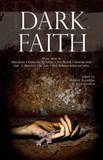 Apex Publications / May 2010
Apex Publications / May 2010
Reviewed by: Blu Gilliand
With a title like Dark Faith, it would have been a simple thing for editors Maurice Broaddus and Jerry Gordon to take the standard horror route in this new anthology from Apex Publications. I mean, a title like that calls forth images of demonic possessions, exorcisms-gone-wrong, tainted Indian burial grounds, haunted churches, killing in the name of God, and other such horror trappings. And I'd totally read that anthology, because there have been lots of awesome stories about those things, and there’s always room for more.
However, that's not the route that Broaddus and Gordon chose to take, and, to be honest, we the readers are better for it. Instead of giving us the familiar, they've decided to challenge us a little bit, both with the content of their anthology, and in the context of our own faith, whatever kind of faith that may be. Many of these stories explore and exploit the idea that faith – the idea of believing in something that we often have no concrete proof of – could possibly lead us in the wrong direction.
Take for instance, “Go and Tell It on the Mountain” by Kyle S. Johnson. In it, we join a man in line to meet Jesus on the day of our Final Judgment. The world has gone nuclear, and therefore the line is long. When our narrator finally gets his time with the Son of God, he finds someone quite far removed from the image laid down in Bible stories — instead of a calm and benevolent teacher, he finds a beaten-down chain smoker who has no more idea of what happens to us when we die than we do. This Jesus prefers to be called “Jeezy,” and has come to earth at the end of times simply because it might make the old man angry.
D.T. Friedman’s excellent “Paint Box, Puzzle Box” explores the idea of creation through the conflict of Artist and Death. Death comes to the Artist one day to collect him, but the Artist strikes a deal — one more year of life so that he can finish his masterpiece. Death agrees, only to have his quarry literally escape into his work.
In “For My Next Trick, I’ll Need a Volunteer,” Gary Braunbeck takes us back to Cedar Hill for a story about choice and fate. Has our story been foretold, as many would have us believe when they say “things happen for a reason,” or is there someone out there who can make a choice that we can’t and set us on a different path?
This is an anthology that’s heavy on ideas, questions and speculation. But isn’t all of faith that way? If you’ve ever believed in anything – or ever wondered how people can believe in the things they do – there are stories here that are going to give you lots to consider.
Broaddus and Gordon have put together one of the most intelligent, thought-provoking anthologies to come our way in quite some time. And, in the course of doing so, they have also managed to put together one of the most original, entertaining anthologies this reviewer has ever read. And while the fresh approach to what could have been a fairly standard collection of scary stories is appreciated, I do hope the editors will soon indulge us all in at least one horror cliché — the sequel.
Purchase Dark Faith edited by Maurice Broaddus and Jerry Gordon.
Evolve: Vampire Stories of the New Undead / Edited by Nancy Kilpatrick
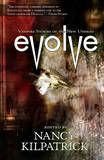 EDGE Science Fiction and Fantasy / March 2010
EDGE Science Fiction and Fantasy / March 2010
Reviewed by: Blu Gilliand
Vampires just won’t stay dead. I don’t care what you try: stakes, garlic, Holy water, bad fiction, terrible movies — they continue to rise up and worm their way back into the public consciousness. The latest resurgence of the vampire sub-genre owes a lot to the Twilight series, not to mention HBO’s True Blood. And this past summer’s bona fide buzz book, Justin Cronin’s epic The Passage, provided more lifeblood to the bloodsuckers.
Squeaking in somewhat under the radar and hoping to ride this current wave of interest comes Evolve: Vampire Stories of the New Undead, the all-Canadian, all-vampire anthology from EDGE Science Fiction and Fantasy. The very title serves as a sort of call-to-arms for the authors, as the book sets out to show how vampires have evolved in order to survive. In doing so, these authors no only give us an idea of how fictional vampires strive to change and adapt, but how the very idea of vampires has managed to do the same.
Kilpatrick kicks off the collection with a long introduction that traces the evolution of the vampire story through its literary, theatrical and pop culture history. In doing so, she lays down the intent ions of the stories that follow — to hew close to the things that make vampires special, while taking them in a whole new direction. And while some of the stories can’t quite wriggle free of the typical vampire conventions, many of them are able to break ground and emerge as a breath of fresh air.
Ronald Hore’s “Chrysalis” is an example of one such story. It’s the tale of a girl who is not only coming into her own as a young woman (and grappling with all the sudden and strange changes that go along with that), but who is also noticing changes of a more supernatural and unexpected variety. Rather than being unsettled by this, she embraces it, and relishes the control over her future that’s suddenly in her grasp.
Rebecca Bradley’s “The New Forty” takes a look at our youth-oriented culture from the perspective of a centuries-old vampire. Although pleased to see her kind finding a foothold in the world, she’s alarmed that it’s the newer, younger generation that’s leading the charge — a generation that she finds more than a little fault with.
Bev Vincent mixes the vampire genre with the crime story in “A Murder of Vampires,” a moody piece that starts off with the gruesome death of a vampire wannabe — a killing by stake that mirrors five previous murders of actual vampires. The story starts on that interesting twist and is a fun ride all the way to the end.
There are other standouts, and even those stories that didn’t work for me get points for taking chances. It’s collections like Evolve that are absolutely vital to the continued growth and health of genre standbys like vampires. Evolve continually thinks outside the coffin, and it’s a thrilling if uneven feast for casual fans and vampire aficionados alike.
Purchase Evolve: Vampire Stories of the New Undead edited by Nancy Kilpatrick.
Darkness on the Edge of Town / Brian Keene
 Leisure / February 2010
Leisure / February 2010
Reviewed by: Rick R. Reed
Synopsis: One morning the residents of Walden, Virginia, woke to find themselves cut off from the rest of the world by an impenetrable wall of darkness.
Review: The premise above sounds intriguing, doesn’t it? Especially for fans of books like Stephen King’s Under the Dome or even Michael Grant’s Gone. Like Darkness on the Edge of Town, those books both had apocalyptic breakdown of civilization premises and both of them worked, more or less. I wish I could say the same for Keene’s work.
The simple synopsis above, taken from the book’s Amazon detail page, is chilling – and it pretty much encapsulates the whole novel – and that’s too bad, because the premise offers so much more potential. The dark is one of our greatest human fears, with us from as far back as most of us can remember. To imagine a world where a thick wall of darkness has surrounded it, cutting off rain, wind, electricity, and other humanity beyond the confines of our one small town is some genuinely creepy fodder for spine-tingling horror. What lurks in the darkness? What if the darkness were a real thing? A force, evil and unconquerable?
To his credit, Keene does explore those last couple of questions in his story of a small town where suddenly darkness reigns and it appears that its twelve thousand or so residents are the only people remaining in existence. But it almost seems as though he set out to downplay what could have been a genuinely horrifying thrill-ride and mute it, burying it in shades closer to gray than black.
Like Stephen King, to whom this author is often compared, Keene gives us a ragtag assortment of working class characters, everymen and everywomen, and sets them down in circumstances that are bizarre and terrifying. Here we have the good-hearted average Joe pizza deliveryman, living with his pot-smoking girlfriend in a rundown apartment. The deliveryman narrates the story, or what there is of a story. The characters, like the story, are bleak and hopeless.
Unfortunately, Keene doesn’t give us much of a story; he gives us a situation. Darkness falls. Darkness is a real thing, a hungry beast capable of preying on our worst fears and longings. Darkness may have destroyed the rest of the world save for the inhabitants of this small Virginia town. Darkness is driving the townsfolk crazy, pitting them against each other and causing them to revert to raping, killing, and mutilating beasts.
But that’s really it. We watch as things go from bad to worse. We listen in on endless conversation about how hopeless the characters’ plights are. We see them feebly try to beat back the pitch. But there’s no real tension. There’s no suspense. The book plods along and never really finds a good foothold, not in sympathetic characters or in a careful building of conflict and tension. I kept reading, partially because I knew I was reviewing the book for this column and partly because I have read other Brian Keene books and loved them. I hoped that this one would redeem itself. I longed for a crackerjack of an ending, a devious twist, maybe an explanation of why.
And I got no payoff. The book, like some of the town’s residents, limped along to an anticlimactic ending that left me feeling dissatisfied and disappointed.
I usually try and write about books that cast a spell in a good way for this column. Unfortunately, Darkness on the Edge of Town cast only a spell of impatience to move on to the next book.
Purchase Darkness on the Edge of Town by Brian Keene.
Columnist Rick R. Reed is the author of thirteen novels, three collections, and has short fiction in more than twenty anthologies. He lives in Seattle, WA. Find out more about the author at his official author website.
Night of Demons / Tony Richards
 EOS (Harper Collins) / October 2009
EOS (Harper Collins) / October 2009
Reviewed by: Martel Sardina
How could two people with no supernatural abilities be expected to save Raine’s Landing when a twisted serial killer finds his way into town? Ex-cop Ross Devries and his sometimes partner, Cassandra Mallory, have to be wishing they knew the answer. The threat they’re facing in Night of Demons, Tony Richard’s second book in this dark fantasy series is a grave one. Raine’s Landing is supposed to be protected from the outside world. How Cornelius Hanlon made it past the magic that keeps Raine’s Landing off the map is anyone’s guess. But now Hanlon’s here and he’s wasted no time in putting his talents to work finding his own brand of “special fun.”
Richards opens the novel by giving readers a terrifying look at “The Shadow Man” – the moniker given to Hanlon after terrorizing Boston on a nearly year-long killing spree. Hanlon was a formidable opponent before finding his way to Raine’s Landing. When he kills one of the town’s most powerful adepts and gains control of the Wand of Dantiere, Hanlon’s possession of the device gives the term “Shadow Man” a whole new meaning.
Meanwhile, Devries and Mallory have their hands full as a series of bizarre murders begin cropping up all over town. Raine’s Landing is generally is quiet place, free from the troubles of the outside world. Nothing makes sense until another outsider, Lauren Brennen, the cop who has been pursuing “The Shadow Man” links Hanlon to the current crimes. Ross is grateful for Lauren’s assistance; however, Cassie is put off by it. Will the trio be able to work together? Or will “The Shadow Man” find a way to pit them against each other?
As the tale unfolds, Richards successfully cross genres, giving readers elements of mystery, thrills and sheer horror. In stories like this, you are not supposed to root for the villain, but it’s so hard to find a good serial killer in fiction these days. This reviewer found herself taking delight in certain lines of dialogue spoken by “The Shadow Man” and wishing that Richards had given him more time on the page.
Not having read Dark Rain puts this reviewer at a bit of a disadvantage, removing the ability to comment on how the series up to this point works on the whole. In Night of Demons, Richards provides enough backstory to ground readers in the current action and leaves out enough of the details so if you haven’t read Dark Rain yet, you’ll want to. And if the villain in Dark Rain is half as deliciously evil as “The Shadow Man,” you won’t be disappointed regardless of which book starts your journey to Raine’s Landing.
Purchase Night of Demons by Tony Richards.
Internecine / David J. Schow
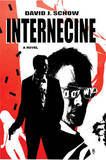 Thomas Dunne Books / August 2010
Thomas Dunne Books / August 2010
Reviewed by: Daniel R. Robichaud
David J. Schow, the father of splatterpunk (well, the term, anyway), returns with his latest excursion into novel as weapon, this time targeting the espionage-thriller genre with a tale of bad guys and bad guys.
The story revolves around an advertising man, Conrad Maddox, who finds himself in accidental possession of someone else's airport locker key. Curious as anyone would be, he uses the key and discovers an unclaimed Halliburton case. Still curious, he opens the case and seals his fate.
The Halliburton contains deadly weapons, in depth reportage for the assistant to a politician his company is working for, and false Federal credentials. A simple act--opening the case--is enough to drop kick him into the subterranean world of espionage, double dealings, and assassination. He soon finds himself drowning deep in trouble, but rescued from imminent death by a shadow ops man called Dandine (for whom the case was intended). What follows is a sometimes frantic, sometimes talky tale of the strange bond these two men form while tracking down answers about the mysterious forces at work (an organization called NORCO), the motivations for those forces, as well as reeducating its readers in the workings of modern day international espionage. In a nutshell: This isn't your granddaddy’s James Bond.
The plot often treads familiar ground, unsurprising as it is derived from "the wrong man" idea underlying several of Alfred Hitchcock's films as well as assorted hardboiled paperbacks from Fawcett Gold Medal (as well as the more recent Hard Case Crime series). Maddox's tale offers twists and turns aplenty and a few authentic surprises, a large cast of helpful and/or antagonistic bastards (a majority of which are macho males, sadly), and concludes with a finale that leaves few dangling threads unresolved. However, the plot is not really the point of this novel.
As this is a work from the World Fantasy Award winning author of "Red Light" and the International Horror Award winning author of Wild Hairs, it is anything but a light or mindless romp.
The title alone suggests slaughter as well as dangerous conflict. Plenty of both are found in these pages. As well as a sizeable pool of fictional characters, Internecine takes quite a few thoughtful shots at popular culture. Here is where the novel's real meat can be found. Apart from the almost-too-easy skewering of unrealistic thriller films (especially pop portrayals of the material herein portrayed), Internecine takes a hard and cynical look at the field of advertising and the mindset of the advertiser. The ugly world of shadowy subterranean operators acting outside the awareness of normal folks (dubbed "the walking dead" because they lack real lives) but influencing their world in subtle ways is a sure stand in for the even uglier world of advertising, and Conrad Maddox acts as both eyewitness and tour guide to both realms via first person narration.
While Conrad is no killer, no government torturer, in short order he reveals himself to be decreasingly likeable. His narration reveals the detached voice of a sociopath whose target is not human life but human minds. The passages explaining his manipulative outlook is where this book gets truly dark.
Longtime readers of horror fiction, whether they cop to it or not, become rather desensitized to certain violent acts. A level of depravity is expected, and as such loses its shock value. However, the one thing that still nails me is the ugly mindset operating behind those violent acts. Not the clichéd serial killer's flashback-to-momma chapters in banal novels, but the sorts of deeply wrong monstrosities that otherwise look and act and reason like normal human beings. A rogue's gallery of them already populates Schow's fiction (i.e. "Bad Guy Hats," "Refrigerator Heaven" and "Unhasped"). Internecine offers further specimens aplenty, but the at once sympathetic yet awful narrator himself, provokes me the most.
Maddox is a paid manipulator, a man who is himself incapable of making lasting relationships with normal people, yet who understands "the walking dead" world of lawyers and accountants and gas station attendants and independent contractors and book reviewers and soccer moms well enough to understand the ways to make them think what he wants them to think and to act how he wants them to act. In fact, at several points, the book takes pains to manipulate the reader and then reveal how the trick was done. It succeeded on me quite a few times. This is an unusual, shaming and disturbing instance of intelligent but mean-spirited text.
Schow's prose is as finely honed as ever. At turns sparse, at turns poetic, and always dead on the mark, it is a pleasure to see this level of craft. The subject matter is typically grim, often witty, but always engaging.
On the surface, Internecine succeeds as a nasty thriller. However, underlying this somewhat comfortable story is something even nastier: a challenging, confrontational text. A book with real bite.
Purchase Internecine by David J. Schow.
Yuppieville / Tony Richards
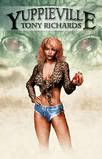 Screaming Dreams / March 2010
Screaming Dreams / March 2010
Reviewed by: Martel Sardina
Yuppieville. Now why would anyone want to live in a place like that?
That’s exactly what Frank is thinking when his wife, Joannie, proposes the idea of leaving Los Angeles for a quiet suburban life in Youngesville, Nevada. Frank is not quite ready to give up city living. But Joannie’s biological clock is ticking and there’s no way she’s going to raise a baby in a neighborhood rife with gang shootings and crime.
Eventually Frank gives in. Joannie has no trouble making the transition and figuring out a way to fit in. For the first time, she seems genuinely happy. Frank, on the other hand, isn’t. After a strange encounter with his new neighbor, Leonora, Frank’s left wondering what kind of person she really is. Was her come-on some kind of a test? How will he tell Joannie about it? Or would telling her be a big mistake?
While Joannie becomes more entrenched in their new life, Frank sees more and more that he dislikes. Youngesville and its residents are too perfect. And Frank knows that Utopia doesn’t exist. He enlists his brother to help research the history of Youngesville, to find out what is really going on in town.
Richards does a wonderful job of creating conflict, tension and suspense as Frank struggles to find the answers he’s looking for. Youngesville is a creepy place, inhabited by equally creepy people. But what makes them scary is the doubt and the illusion of normalcy. Are there monsters hiding in plain sight? Or is Frank just paranoid?
Yuppieville is full of surprises. It’s not Stepford, Connecticut or Twin Peaks, Washington. But if you liked either of those fictional places, a trip to Youngesville, Nevada might be up your alley. Stay as long as you dare.
Purchase Yuppieville by Tony Richards.
The Wolf at the Door / Jameson Currier
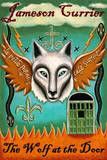 Chelsea Station Editions / April 2010
Chelsea Station Editions / April 2010
Reviewed by: Vince A. Liaguno
Ghosts haunt a gay guesthouse and prompt its proprietor to re-examine his spirituality and the meaning of life in Jameson Currier’s latest novel, The Wolf at the Door.
Avery Greene Dalyrymple III is a middle-aged gay man whose everyday life is a series of small calamities revolving around the New Orleans guesthouse he runs with his ex-(life) partner. Overworked and overwrought on the business front while underwhelmed in the romance department with his current beau, Hank, the last thing Avery needs is to play innkeeper to a bunch of lost souls who have come to regard Le Petite Paradis (grammatical misnomer deliberate) as a holding station for the deceased.
What follows is a delightfully spooky, often kooky, gay vision quest of sorts that finds Avery reevaluating his belief system, questioning his sanity, and more than occasionally dipping into the better bourbons and whiskeys on tap in the guesthouse’s adjacent café.
The Wolf at the Door is the perfect expansion of Currier’s previous genre effort, his Black Quill Award-winning collection of gay ghost stories A Haunted Heart and Other Tales. He continues to skillfully combine the supernatural with the more recurring themes of modern gay literature — the creation of extended families of friends and lovers as support systems, the struggle of gay men of a certain age for societal relevance, even the lingering specter of AIDS.
Prominent throughout The Wolf at the Door is the exploration of religion and faith. From Avery’s first otherworldly encounter that manifests itself as a sexual tryst to the uproarious denouement in which topless lesbians chant voodoo incantations, Currier shines with his deft balance between Avery’s thought-provoking spiritual journey and the acerbic wittiness of his inner monologues:
“But why would a soul want to hang around this place? And why now, after all the years we had lived here did they have to show up? Heaven and hell were just human creations. Human interpretation. A state of mind. Maybe everyone before us had gotten it all wrong. Maybe souls never departed earth’s atmosphere, just lived on in eternity outside the perspective of time and vision. Maybe ghosts of the living were like humidity, rising and falling according to the whims of Mother Nature, Father Sun, and the orbit of Planet Earth. Or maybe we all needed more fiber in our diet to make sure that we did not disturb anyone else in another life.”
As the paranormal pressure surrounding the guesthouse is amplified, Avery opens his mind and the long-renounced homiletic rhetoric of his Southern evangelist upbringing slowly yields to a decidedly more diverse and flexible cafeteria spiritualism, “a mumbo-jumbo gumbo of different beliefs and superstitions.” Currier wisely employs a subtle tone and pace to Avery’s spiritual awakening – using most of the novel’s duration to chart his progression from would-be atheist to firm believer in an elusive higher power – so that when Avery finally arrives at a place of spiritual conclusion, the moment never feels forced or heavy-handed:
“Was this desperation or true faith? I thought, sitting on the edge of the bed, going over in my mind my newest theory, my newest insight into the problems at hand. What if the ghosts and God were related somehow? What if it all had to do with the psychic consciousness and something beyond it, what the mind of the living believed before the soul died, whether the religion was Catholic, Baptist, or Buddhist? What if God created ghosts in the same way he created men and women and animals and plants – but for ghosts, he had created windows of passages from one world to the next to allow them to pass along meaning or messages from the world of the divine and the afterlife to the world of the living? Of course his theory meant that I must accept the fact of the existence of a Higher Power and that life was not just a random clashing of misadventures and unlikely coincidences as I had always felt my life has warranted and exhibited. This wasn’t accidental. God had planned it. And the ghosts, in a sense, proved to me His existence.”
The Wolf at the Door is imbued with a deep sense of history, with several interweaving stories from the 1820’s Louisiana slave trade that parallel some of the characters’ present-day lives. Although some of the characters from these stories appear in ghostly form, we learn about them mostly through a series of old journal entries. Although in moderation these lend a sense of historical authenticity to the proceedings, at times these extended passages slow down the momentum and take the reader out of the main narrative for a bit too long. By the novel’s third act, additional citations from newspaper clippings and an unpublished manuscript also clog up Currier’s otherwise steady pacing, but it’s one small criticism in an otherwise well-executed tale.
With an eclectic and entertaining cast of characters and strong sense of setting, Currier may not even realize himself that he’s got the makings of a potential series here — his very own paranormal French Quarter-set Tales of the City. Like Armistead Maupin’s Mouse Tolliver, Currier’s Avery Dalyrymple is larger-than-life and intricately flawed, and the fact that he just can’t seem to get out of his own way makes him primed for misadventure and gay mayhem.
And, like Maupin’s iconic San Franciscan tableau of Barberry Lane, Currier’s Dumaine Street guesthouse and adjacent Café Surtout become fictional focal points of Big Easy authenticity here. One of Currier’s strengths has always been the ability to soak his narrative in a rich, authentic ambiance and The Wolf at the Door is no exception, with sentences that resonate with the decadent rhythms of the French Quarter and paragraphs that positively drip with Southern gothic moodiness. His fully-realized locale comes even further to life when set against the culinary backdrop of the café, with savory descriptions of the cayenne-drenched Creole cuisine adding texture and local spice to his fictional world.
While The Wolf at the Door is less likely to scare and more apt to beguile, genre fans will nonetheless find plenty to appreciate in Currier’s otherworldly version of It’s a Wonderful Life fused with all the ensemble wit of Tales of the City and the regional gothic texture of Anne Rice’s Interview with the Vampire. Savor this one like a bowlful of spicy jambalaya and a sniffer of fine aged bourbon on a hot, humid night.
Purchase The Wolf at the Door by Jameson Currier.




